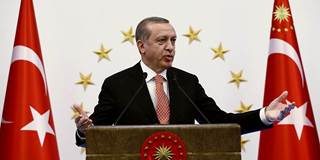Turkey’s Justice and Development Party, led by President Recep Tayyip Erdoğan, rose to power in 2002 on the promise that it would ensure religious freedom for pious Muslims. Fourteen years later, “freedom” is the last thing the party has delivered.
DURHAM – Turkey’s Justice and Development Party (AKP) rose to power in 2002 on the promise that it would give pious Muslims religious freedom. Fourteen years later, “freedom” is the last thing the AKP has delivered.
Today, even AKP supporters need to measure their words carefully, lest they be perceived as criticizing the government or siding with its enemies. This imperative has intensified since the failed coup against President Recep Tayyip Erdoğan’s government on July 15. Now, destroying any evidence of association with the AKP’s foes – especially Fethullah Gülen, the reclusive Pennsylvania-based imam whom the government accuses of masterminding the putsch – is a matter of self-preservation.
Erdoğan’s government is by no means the first to compel Turkish citizens to hide their preferences and beliefs. Under the secular governments that ruled Turkey from the 1920s to 1950, and to some extent until 2002, pious Turks seeking advancement in government, the military, and even commerce had to downplay their religiosity and avoid signaling approval of political Islam.

DURHAM – Turkey’s Justice and Development Party (AKP) rose to power in 2002 on the promise that it would give pious Muslims religious freedom. Fourteen years later, “freedom” is the last thing the AKP has delivered.
Today, even AKP supporters need to measure their words carefully, lest they be perceived as criticizing the government or siding with its enemies. This imperative has intensified since the failed coup against President Recep Tayyip Erdoğan’s government on July 15. Now, destroying any evidence of association with the AKP’s foes – especially Fethullah Gülen, the reclusive Pennsylvania-based imam whom the government accuses of masterminding the putsch – is a matter of self-preservation.
Erdoğan’s government is by no means the first to compel Turkish citizens to hide their preferences and beliefs. Under the secular governments that ruled Turkey from the 1920s to 1950, and to some extent until 2002, pious Turks seeking advancement in government, the military, and even commerce had to downplay their religiosity and avoid signaling approval of political Islam.